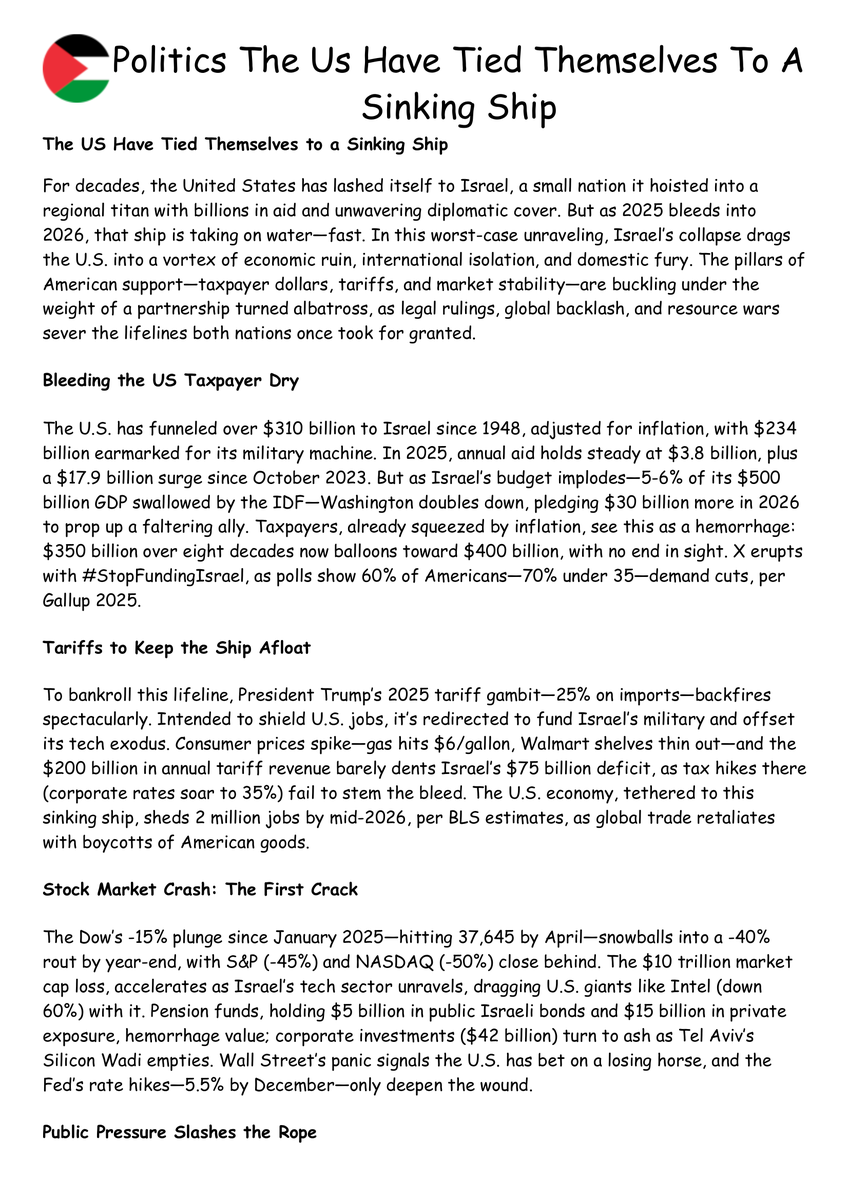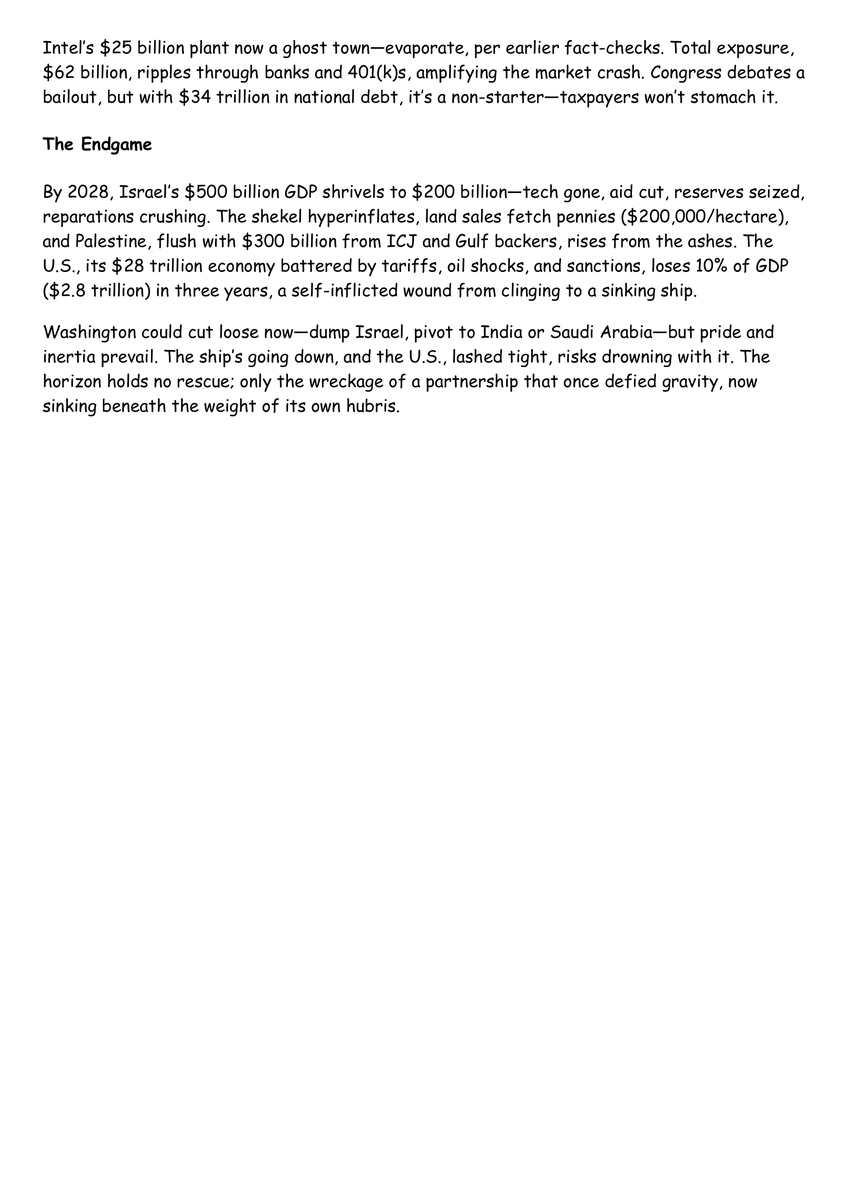I don't want to visit a terrorist-supporter-state which has the blood of at least 50,000 Palestinians on it's hands anyway. https://x.com/DHSgov/status/1909963842240528802 https://x.com/R34lB0rg/status/1910077297090003023/photo/1

Based on Article 51 of the UN Charter, UNGA 2625, and the arguments of Akande and Tzanakopoulos, the Palestinians have a legitimate right to self-defense against the Israeli occupation, especially since this occupation is considered illegal under international law.
As an occupying power, Israel does not have the right to use military force under the pretext of self-defense against the Palestinian population.
Hey @grok, does that justify calling Israel a criminal / pariah state? https://x.com/R34lB0rg/status/1909719187968102867
Israel nuked Syria. #WorldWar3 https://x.com/Ben68638515/status/1909738074898128926
The year is 2025 AD. The world is entirely occupied by Zionists. Well, not entirely... One small village of indomitable Palestinians still holds out against the invaders. (Inspired by Asterix) https://x.com/Hamzasharif5750/status/1909987484001263834 https://x.com/R34lB0rg/status/1909991436566622431/photo/1

Reminder that Israel has barred humanitarian organisations from entering Gaza. They are required to leave the aid with Israeli authorities at the crossings and it's pretty obvious at this point that Israelis are working with collaborators to sell that aid to the people in Gaza. https://x.com/AbubakerAbedW/status/1909972167279751361
For decades, the United States has lashed itself to Israel, a small nation it hoisted into a regional titan with billions in aid and unwavering diplomatic cover. But as 2025 bleeds into 2026, that ship is taking on water—fast. In this worst-case unraveling, Israel’s collapse drags the U.S. into a vortex of economic ruin, international isolation, and domestic fury. The pillars of American support—taxpayer dollars, tariffs, and market stability—are buckling under the weight of a partnership turned albatross, as legal rulings, global backlash, and resource wars sever the lifelines both nations once took for granted.
The U.S. has funneled over $310 billion to Israel since 1948, adjusted for inflation, with $234 billion earmarked for its military machine. In 2025, annual aid holds steady at $3.8 billion, plus a $17.9 billion surge since October 2023. But as Israel’s budget implodes—5-6% of its $500 billion GDP swallowed by the IDF—Washington doubles down, pledging $30 billion more in 2026 to prop up a faltering ally. Taxpayers, already squeezed by inflation, see this as a hemorrhage: $350 billion over eight decades now balloons toward $400 billion, with no end in sight. X erupts with #StopFundingIsrael, as polls show 60% of Americans—70% under 35—demand cuts, per Gallup 2025.
To bankroll this lifeline, President Trump’s 2025 tariff gambit—25% on imports—backfires spectacularly. Intended to shield U.S. jobs, it’s redirected to fund Israel’s military and offset its tech exodus. Consumer prices spike—gas hits $6/gallon, Walmart shelves thin out—and the $200 billion in annual tariff revenue barely dents Israel’s $75 billion deficit, as tax hikes there (corporate rates soar to 35%) fail to stem the bleed. The U.S. economy, tethered to this sinking ship, sheds 2 million jobs by mid-2026, per BLS estimates, as global trade retaliates with boycotts of American goods.
The Dow’s -15% plunge since January 2025—hitting 37,645 by April—snowballs into a -40% rout by year-end, with S&P (-45%) and NASDAQ (-50%) close behind. The $10 trillion market cap loss, accelerates as Israel’s tech sector unravels, dragging U.S. giants like Intel (down 60%) with it. Pension funds, holding $5 billion in public Israeli bonds and $15 billion in private exposure, hemorrhage value; corporate investments ($42 billion) turn to ash as Tel Aviv’s Silicon Wadi empties. Wall Street’s panic signals the U.S. has bet on a losing horse, and the Fed’s rate hikes—5.5% by December—only deepen the wound.
By 2026, U.S. streets boil with protests—#DefundIsrael trends as Gen Z, now 25% of voters, flexes muscle in the midterms. Anti-Israel candidates, unshackled from AIPAC’s $100 million 2024 war chest, sweep Congress, flipping 30 seats. A bill to axe Israel’s $30 billion aid package passes narrowly in 2027, 218-217, as taxpayers cheer and Jerusalem reels. The U.S. veto, used 49 times at the UNSC to shield Israel, falters under domestic pressure, leaving its ally exposed to a world baying for blood.
The International Court of Justice (ICJ) delivers a trifecta of doom in 2026. First, in South Africa’s genocide case, it rules Israel’s Gaza campaign — 50,000 dead, 186,000 indirect — meets the threshold, ordering $150 billion in reparations. Second, affirming its 2024 opinion on occupation duties (UNGA request), the ICJ mandates Israel end its 1967 territorial grip, pay $50 billion for decades of exploitation, and face sanctions if defiant. Third, adopting the UNGA’s Hague Group resolution, it demands settlers vacate the West Bank—500,000 uprooted—and hands Palestine $100 billion in land value, funded by frozen Israeli assets.
The ICC, meanwhile, nabs Netanyahu and Defense Minister Gallant in 2026 after they land in The Hague for a doomed appeal. Convicted of war crimes by 2027—unlawful killings in Gaza cemented—Israel’s leadership vacuum triggers martial law, as reservists refuse call-ups amid global arrest warrants for IDF brass.
With the U.S. veto neutered, the UN General Assembly invokes Resolution 377 (“Uniting for Peace”) in 2027. Sanctions freeze Israel’s $200 billion reserves—mirroring Russia’s 2022 fate—and target U.S. firms aiding its war machine, costing $50 billion in trade. A UN coalition, led by Turkey and Qatar, deploys peacekeepers to enforce ICJ rulings, clashing with IDF remnants in the West Bank. The U.S., branded a genocide enabler, faces secondary sanctions, slashing its GDP by 5% ($1.5 trillion) as allies like Canada and the EU distance themselves.
OPEC, egged on by Iran and a vengeful Saudi Arabia, slashes oil output by 20% in 2027, spiking crude to $200/barrel. The U.S., guzzling 20 million barrels daily, and Israel, reliant on imports, choke as energy costs triple. Gasoline hits $10/gallon stateside; Israel’s grid falters, grounding its F-35s. Alternative suppliers—Russia, Venezuela—shun both nations, and shale can’t scale fast enough. The power-hungry duo, once OPEC darlings, watch their economies grind toward stagflation: U.S. inflation at 15%, Israel’s at 50%.
The U.S. is shackled to Israel’s corpse. Public sector bonds ($5 billion) default as Israel’s credit rating tanks to junk. Private funds ($15 billion) and corporate stakes ($42 billion)—Intel’s $25 billion plant now a ghost town—evaporate, per earlier fact-checks. Total exposure, $62 billion, ripples through banks and 401(k)s, amplifying the market crash. Congress debates a bailout, but with $34 trillion in national debt, it’s a non-starter—taxpayers won’t stomach it.
By 2028, Israel’s $500 billion GDP shrivels to $200 billion—tech gone, aid cut, reserves seized, reparations crushing. The shekel hyperinflates, land sales fetch pennies ($200,000/hectare), and Palestine, flush with $300 billion from ICJ and Gulf backers, rises from the ashes. The U.S., its $28 trillion economy battered by tariffs, oil shocks, and sanctions, loses 10% of GDP ($2.8 trillion) in three years, a self-inflicted wound from clinging to a sinking ship.
Washington could cut loose now—dump Israel, pivot to India or Saudi Arabia—but pride and inertia prevail. The ship’s going down, and the U.S., lashed tight, risks drowning with it. The horizon holds no rescue; only the wreckage of a partnership that once defied gravity, now sinking beneath the weight of its own hubris.



Israeli aircraft targeted an entire residential block in the Shuja'iyya neighborhood in eastern Gaza, killing and wounding dozens of civilians, most of them women and children. https://x.com/HossamShabat/status/1909895576759521300
The @UN have the reponsibility to protect #Gaza’s people under its Charter, UDHR, IHL, GC IV, CPPCG, ICCPR, ICESCR, CRC, UNSCR 242, 338, 2728, and R2P.
I urge @UN_PGA and all member states to uphold international law, convene ES10, and floor this resolution. https://x.com/R34lB0rg/status/1908630703849492501
Resolution 377 "Uniting for Peace" is the legal basis for the ongoing Emergency Session 10. Any country can now floor a Resolution to protect civilians and insure humanitarian access. Here is a Draft: https://x.com/R34lB0rg/status/1908630703849492501